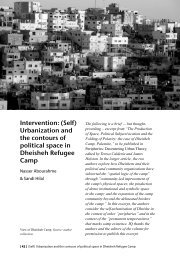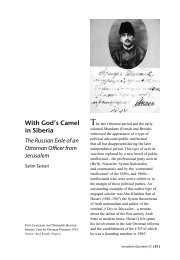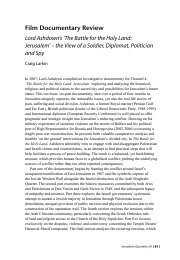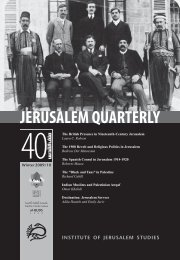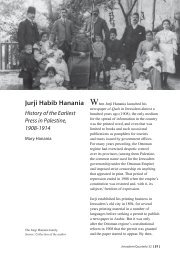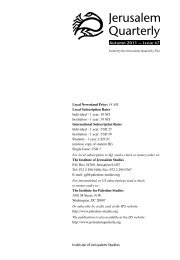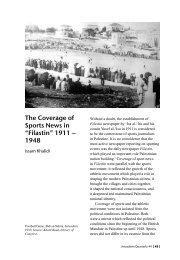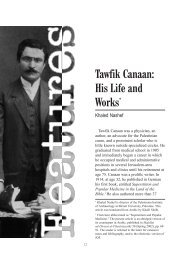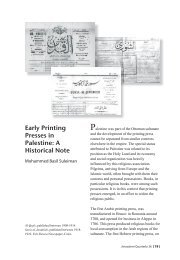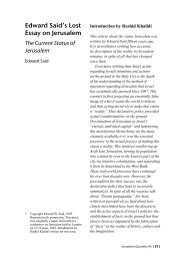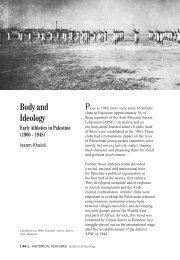PLUNDERING PALESTINE - Jerusalem Quarterly
PLUNDERING PALESTINE - Jerusalem Quarterly
PLUNDERING PALESTINE - Jerusalem Quarterly
Create successful ePaper yourself
Turn your PDF publications into a flip-book with our unique Google optimized e-Paper software.
the largest mass claims program in world history. A national mechanism would lack the<br />
resources and technical expertise to meet the full scope of the claims. Moreover, as was<br />
the case with the return and restitution process for Bosnia, international intervention<br />
may be needed to affect the appropriate domestic reforms needed to fulfil the terms of<br />
the peace agreement and allow for the full function of the commission, especially if the<br />
restitution of property is involved.<br />
The composition, location and structure of the implementation mechanism,<br />
among other matters, will have to be resolved in the course of negotiations between<br />
Israel and Palestinians once there is a commitment to address the core elements of the<br />
conflict, including the right of return. The seemingly-technical nature of these questions<br />
(such as who will sit on the international claims commission) has significant political<br />
ramifications, and therefore, it is reasonable to expect the beneficiaries of the agreement<br />
to have a say in what is decided. And, without a doubt, they should have a say in what<br />
forms of reparation would satisfy their need for justice and closure.<br />
In his final report, the UN Special Rapporteur on the Right to Reparations Theo Van<br />
Boven noted that gross violations of human rights are by their very nature irreparable<br />
and redress will fail to be proportional to the grave injury experienced, especially<br />
where the violations have been committed on a massive scale. 19 But the purpose behind<br />
reparations – to hold states accountable for their wrongful acts – is a necessary precursor<br />
to restoring the rule of law, peace and stability. The recognition of a person’s experience<br />
of dispossession is also met through the provision of individual reparations. A process<br />
of reparation and property reclamation will be an important component of establishing<br />
peace between Israelis and Palestinians even if the actual measure of justice meted out in<br />
the end falls short of the full experience of 60 years of displacement and dispossession.<br />
It is clear that there is substantial international practice to draw on to make the provision<br />
of remedies to Palestinians for the losses they suffered in 1948 a reality. This short<br />
comment has attempted to offer some indication of how that may happen. Yet, it is<br />
necessary to clarify some of the most contentious issues of peace before a final process<br />
can be laid out and before individual property owners may be able to post their claims<br />
for justice. In the meantime, Palestinians entitled to restitution and compensation for<br />
lost properties should preserve any documentary evidence of their property ownership<br />
or use and continue to seek accountability from Israel in line with universal norms and<br />
standards.<br />
Leila Hilal was a visiting fellow at the Refugee Studies Centre at the University of Oxford during<br />
the drafting of this essay. This work was carried out with the aid of a grant through the Middle<br />
East Expert and Advisory Services Fund, which is a programme supported by the Canadian<br />
International Development Agency (IDRC), in cooperation with the Department of Foreign Affairs<br />
and International Trade Canada. She is a former legal advisor on refugees at the Negotiation<br />
Support Unit in Ramallah.<br />
<strong>Jerusalem</strong> <strong>Quarterly</strong> 33 [ 63 ]


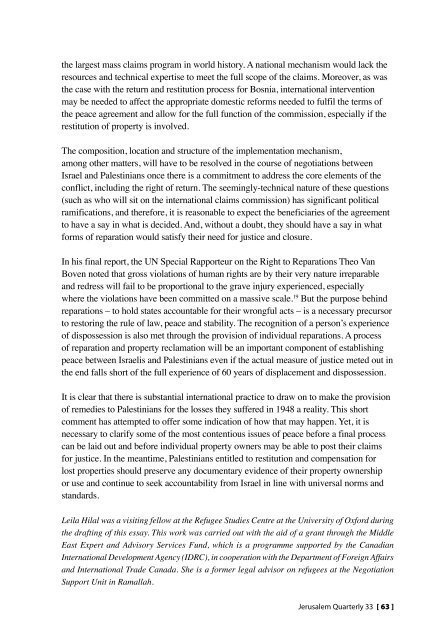
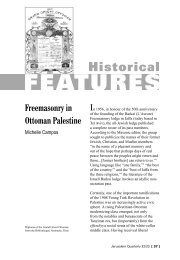
![In Search of Jerusalem Airport [pdf] - Jerusalem Quarterly](https://img.yumpu.com/49007736/1/180x260/in-search-of-jerusalem-airport-pdf-jerusalem-quarterly.jpg?quality=85)
